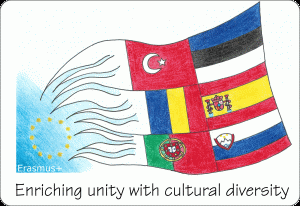 Our project – Enriching unity with cultural diversity – reflects the needs stemming out of the fact that the number and diversity of cultures, customs and languages enrich our lives. The importance of preserving European cultural heritage and its diffusion among the participants from partner countries (Spain, Estonia, Portugal, Turkey, Romania and Slovenia) is at the core of this project.
Our project – Enriching unity with cultural diversity – reflects the needs stemming out of the fact that the number and diversity of cultures, customs and languages enrich our lives. The importance of preserving European cultural heritage and its diffusion among the participants from partner countries (Spain, Estonia, Portugal, Turkey, Romania and Slovenia) is at the core of this project.
Since the project is focused on getting to know and understanding cultural differences, we chose countries dominated by different religions: Catholic, Muslim, Orthodox and Evangelical. These religions helped shape the chosen countries and influenced their cultural heritage greatly. The main goals of the project are strengthening the awareness of cultural heritage preservation, developing interculturality, improving our competence in the field of inclusion of all learners, and developing digital and professional competences of all participants.
The purpose of all preceding activities is to digitalize the material created by all partner schools. All students will be included in the different project activities, while refugees, immigrants, special needs children and gifted children will take part in some specific activities. Professional employees will also participate in all the proposed activities at each partner school, while specific activities will be carried out by teachers with specific areas of expertise together with the project team.
Each mobility will comprise of six participants – three students and three professional employees from each school. Slovenia will focus on the usefulness of organic gardening by taking its guests through the process of gardening in a typical Slovenian garden called gartlc. All participants will then present their own country’s typical dishes and put the recipes into a digital recipe booklet. For a more hands-on approach to folk music of each region, all partner schools will present one of their traditional folk songs, dances and instruments by making a video and putting in on a DVD.
During the actual visit of partner schools, host schools will also organize a school concert. For the purpose of getting to know famous people from the different local communities, all participants will explore these people’s lives and publish their findings in an online newspaper. Traditional customs from each country will be explored by creating a calendar. Guided excursions to all partner schools’ regions will be organized so that the students will get the opportunity to learn about the most important cultural monuments of the partner countries. They will note the location of these monuments on an interactive map. Various workshops will be carried out during the mobilities with the help of different local associations in order to familiarize the participants with typical handwork of all partner countries. Participants will learn old folk movement games by watching a DVD containing video footage of the game rules put together by the participants. The methodology of this project is based on the school curriculum of each individual partner school and the key European competences for the year 2018.
We wish to realize one of the main goals of the strategic partnership programme KA2, namely the social and educational value of European cultural heritage. Participants of the project will focus on the realization of all set goals throughout all phases. They will use these goals as a basis for raising awareness of the importance of cultural heritage, cultural differences, ICT usage, new teaching methods, and linguistic and social competences. The project will bring long-term benefits in relation to the exploration of our own cultural heritage. By experiencing our cultural heritage, we can discover our diversity and start a culturally friendly conversation about our common points.
Is there a better way of enriching our lives than to be in contact with something in the centre of the question of who we are?
